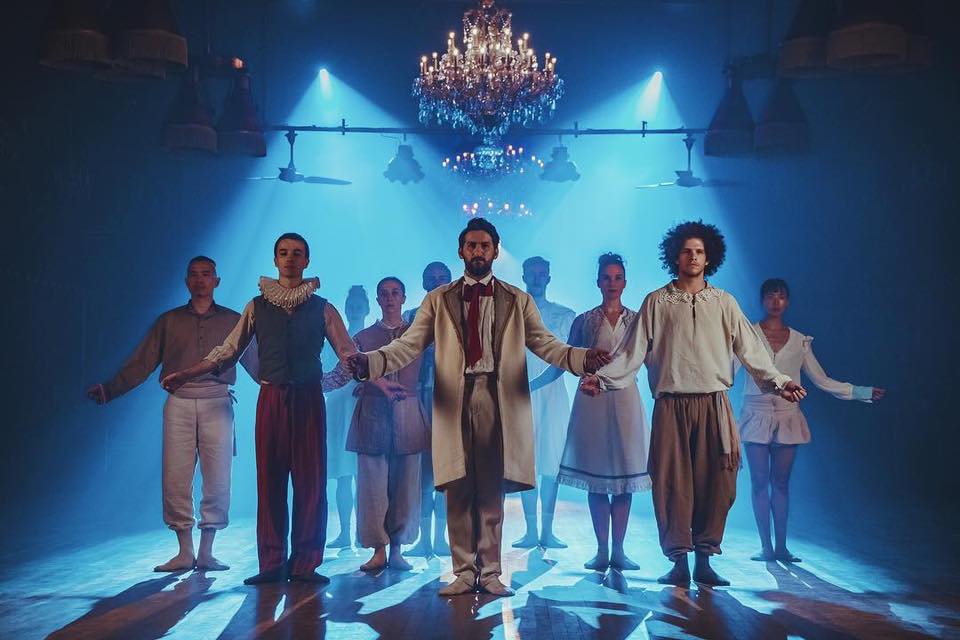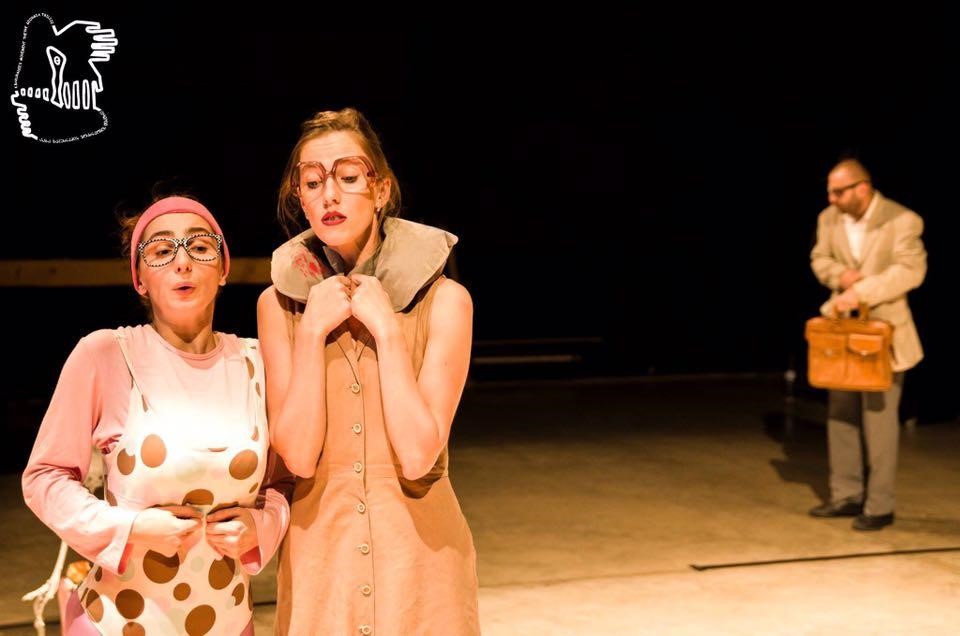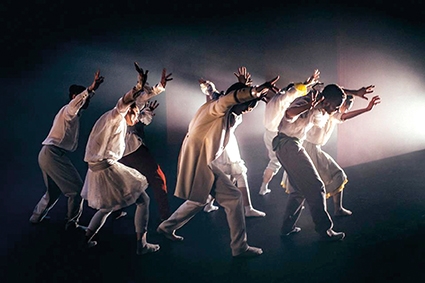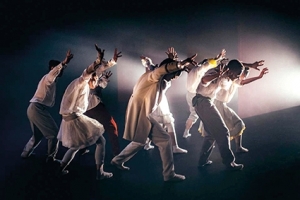GIFT Closes with Hofesh Shechter Company
REVIEW / BLOG
Friday 16 November is the final day of the 21st Georgian International Festival of Arts (GIFT) in honor of Michael Turmanishvili. The festival has been running for a month, bringing international theater, film, song, dance and cultural discussions to the city of Tbilisi; a wide range of productions promoting European understanding and culture to Georgian and international theater-goers. Alan Lucien Øyen and his company Winter Guests brought their kabuki-flamenco mash-up Simulacrum; the Ingri Fiksdal Company bought their anthropological dance-concert, State. There was also an Italian Focus, Sardinian Culture Days, with Tenore Murales sharing their polyphonic singing, and Sardegna Teatro performing Macbettu, Shakespeare’s classic Macbeth, in Sardinian. We also welcomed the Hofesh Schecter Company from the UK, and several renowned Georgian and Russian plays.
Let’s take a look back at some of the highlights of this year’s GIFT.
The last week of GIFT 2018 kicked off with the culture-clashing "Simulacrum" at the Marjanishvili Theater. Bought to Tbilisi by Norwegian director Alan Lucien Øyen and his company Winter Guests, the piece was a meeting of Argentinian dancer Daniel Proietto and 77-year-old Japanese flamenco legend Shoji Kojima. Themes and narratives from both of the performer's lives were interwoven with detailed studies and presentations of each impressive art form, flamenco and kabuki.
Our Norwegian focus continued with choreographer Ingri Fiksdal's dance-concert, "State," performed at the Royal District Theater to a packed auditorium. Ritual dances from all over the world, live sound and beautiful costumes combined to create a multi-sensory journey for the audience.

The final performance of the festival will take place at the Rustaveli Theater on Friday 16 November. British dance company Hofesh Shechter Company will perform their piece entitled "Show" for the second time, having performed to an excited audience on Wednesday. The dance performance is composed of three acts: The Entrance, Clowns and Exit and revolves around a group of anarchic performers as they play their parts in a macabre circus of comedy, murder and desire.
The previous week at GIFT, we celebrated all things Italian. Our Italian Focus opened on November 2 with a presentation on contemporary Italian Theater, ‘Rispondi al Futuro’, held by Michele Panella. The talk was surprisingly well attended, with people spilling out the door! During the talk, we heard from Tenore Murales, a group of five Sardinian singers, who bought their unique form of polyphony to the festival.
That evening, Sardegna Teatro’s Macbettu opened at the Rustaveli theater. Shakespeare’s classic Macbeth, performed in Sardinian, with Italian and Georgian subtitles. It was an outstanding piece of theater, weaving rituals of ancient Sardinian traditions in with the medieval Scottish play. At the end, the performers got an instant standing ovation from the whole theater.
The International Symposium on Traditional Polyphony was on at the State Conservatoire. Now in its 9th year, the symposium brings together singers and musicologists from all over the world for five days of concerts, lectures, film screenings and plenty of impromptu singing. I was in my element! Tenore Murales sang at their closing concert on Saturday evening, along with plenty of Georgian and international ensembles.

Week two of the festival, we welcomed the renowned Russian director Dmitry Krymov, who bought his production of the classic Russian play Bezpridannitsa (Without a Dowry) to the Rustaveli Theater, performed by students of the Moscow Theater “School of Dramatic Arts”. Apparently, this is a play that every Russian kid has to study at school, but coming from England, I had never heard of it, so wasn’t sure what to expect. It turned out to be a beautiful example of theatrical parataxis, or as Hans-Thies Lehmann describes it, “the de-hierarchization of theatrical means”. As a non-Russian speaker, I was very grateful for this! Krymov used video projection, music, song, costume, and a well-timed wind machine to tell the story as well as words. And as you would expect from a Russian laboratory theater, the actor's physicality and expression were flawless.
Keely and Du, written by American playwright Jane Martin in the 1980s, was translated into Georgian and directed by GIFT’s own Artistic Director Keti Dolidze. Performed in the Liberty Theater, the piece concerned itself with the contentious issues of rape, abortion, religion and suicide. Though it may not sound like the cheeriest way to spend a Monday evening, the piece skillfully negotiated the emotional topics. It’s sad and frustrating that, though written 30 years ago in America, this play is still relevant today, in any country. It was certainly a brave choice to program the play here in Georgia and at this time, and I think the audience appreciated that.
On October 15, we welcomed the six members of the international collective The Krumple, from Norway, France, Denmark and the UK. It was the first time in Georgia for all of them, so I made sure to take them for some traditional Georgian food and wine that evening. The Krumple, graduates of the Lecoq school in Paris, brought their innovative piece “Yokai, Remedy for Depair.” The Royal District Theater hosted Yokai, an exceptionally beautiful piece showcasing the artists’ physical talent and imaginations wonderfully. They captured the audience with intricate object manipulation, and interweaving storylines. The show was even better the second time round and moved some audience members to happy tears!

We then welcomed the next show of the festival: Astigmatists, directed by Ioseb Bakuradze at the Movement Theater. The feel-good production was created in the style of silent movies and performed by a talented cast of five. The physical comedy told the story of a somewhat dysfunctional family, and what happens when you see the world a little differently.
On October 22, we welcomed Charles Landry, a British author and international advisor on the subject of creative cities. He gave a fascinating talk at the Tbilisi City Assembly on the Art of City Making, in association with the Georgian National Tourism Administration (GNTA).
The following weekend, we welcomed the Dmitry Krymov Laboratory from the Moscow Theater “School of Dramatic Arts”, presenting their show Bezpridannitsa (Without a Dowry).
These, along with culturally enriching round-table talks, film screenings, public lectures and folk parties combine to create the most exciting program the festival has seen thus far.
I'm so sad that we've come to the end of the festival. GIFT has been such a wonderful experience for me. As a young person starting my career in the arts, I couldn't have hoped for a better opportunity or a more welcoming team. Not only have I seen some of the best international theater of my life here, but I've also learned about working behind the scenes, helping the performers and crew to get everything ready for curtain up. I'm so grateful to have had this opportunity and I hope I can come back next year! For now, Tbilisi, it’s breaking my heart, but I have to love and leave you.
By Holly Taylor-Zuntz
Photos by Ilia Baburashvili











